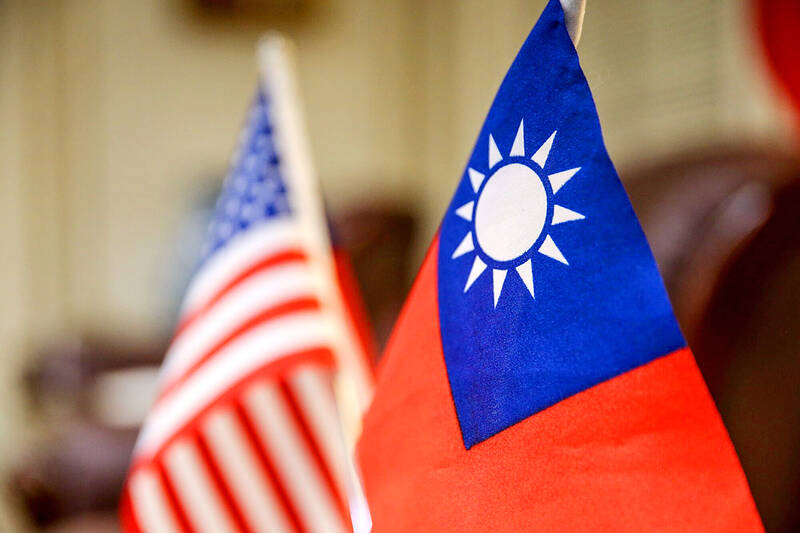The first round of talks between Taiwan and the US on an agreement to prevent the double taxation of income is expected to take place in the coming weeks, the US Department of the Treasury said on Tuesday.
Both sides have said such an agreement would foster more investment, and Taipei has long pushed for it. The move was announced as a senior US diplomat who helps manage ties with Taiwan arrived in Taipei on Tuesday.
Washington and Taipei do not have formal diplomatic relations, so the lack of a tax agreement means Taiwanese businesses and individuals are taxed on their income by both the US and Taiwanese governments if they work or live in both nations.

Photo: Cheng I-hwa, Bloomberg
Taiwan is a major global supplier of semiconductors essential to a wide range of consumer goods and military equipment. Washington has been keen to get Taiwanese chip companies to build factories in the US.
The launch of the “negotiations on a comprehensive agreement to address double taxation issues” resulted from the US Congress’ efforts to push progress in the area through draft legislation, such as the proposed US-Taiwan Tax Agreement Authorization Act, the treasury department said in a press statement on Tuesday.
US President Joe Biden’s administration is committed to “engaging with relevant committees throughout the negotiation process and working with Congress on legislation to approve a final agreement and implement the agreement through the Internal Revenue Code,” it said.
Both the US and Taiwan can benefit from a comprehensive tax agreement, because such an agreement can “reduce double taxation barriers for further investment by Taiwan into the United States, and vice versa, particularly for the small and medium-sized enterprises that are crucial to a complete semiconductor ecosystem,” the treasury said.
The text of the agreement is expected to be based on the US Model Income Tax Convention and covers such issues as “reduction of withholding taxes on cross-border payments of dividends, interest and royalties,” and “provisions governing permanent establishments and tax treatment of temporary cross-border workers,” it said.
The agreement should also have “provisions intended to prevent instances of non-taxation of income as well as tax forum shopping,” dispute resolution mechanisms, and provisions for the exchange of information between the US and Taiwanese revenue authorities, so both of them can carry out their duties as tax administrators, it said.
The negotiations are to be conducted through the American Institute in Taiwan and the Taipei Economic and Cultural Representative Office in the US, it said.
As of July 31, Taiwan had signed comprehensive agreements on double taxation with 35 countries, including Canada, Germany, Israel, Japan, the UK, Australia and Paraguay, information published on the Ministry of Finance’s Web site shows.

Taiwanese were praised for their composure after a video filmed by Taiwanese tourists capturing the moment a magnitude 7.5 earthquake struck Japan’s Aomori Prefecture went viral on social media. The video shows a hotel room shaking violently amid Monday’s quake, with objects falling to the ground. Two Taiwanese began filming with their mobile phones, while two others held the sides of a TV to prevent it from falling. When the shaking stopped, the pair calmly took down the TV and laid it flat on a tatami mat, the video shows. The video also captured the group talking about the safety of their companions bathing

US climber Alex Honnold is to attempt to scale Taipei 101 without a rope and harness in a live Netflix special on Jan. 24, the streaming platform announced on Wednesday. Accounting for the time difference, the two-hour broadcast of Honnold’s climb, called Skyscraper Live, is to air on Jan. 23 in the US, Netflix said in a statement. Honnold, 40, was the first person ever to free solo climb the 900m El Capitan rock formation in Yosemite National Park — a feat that was recorded and later made into the 2018 documentary film Free Solo. Netflix previewed Skyscraper Live in October, after videos

Starting on Jan. 1, YouBike riders must have insurance to use the service, and a six-month trial of NT$5 coupons under certain conditions would be implemented to balance bike shortages, a joint statement from transportation departments across Taipei, New Taipei City and Taoyuan announced yesterday. The rental bike system operator said that coupons would be offered to riders to rent bikes from full stations, for riders who take out an electric-assisted bike from a full station, and for riders who return a bike to an empty station. All riders with YouBike accounts are automatically eligible for the program, and each membership account

A classified Pentagon-produced, multiyear assessment — the Overmatch brief — highlighted unreported Chinese capabilities to destroy US military assets and identified US supply chain choke points, painting a disturbing picture of waning US military might, a New York Times editorial published on Monday said. US Secretary of Defense Pete Hegseth’s comments in November last year that “we lose every time” in Pentagon-conducted war games pitting the US against China further highlighted the uncertainty about the US’ capability to intervene in the event of a Chinese invasion of Taiwan. “It shows the Pentagon’s overreliance on expensive, vulnerable weapons as adversaries field cheap, technologically